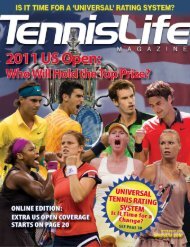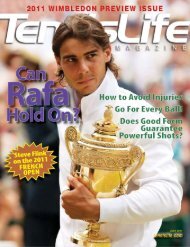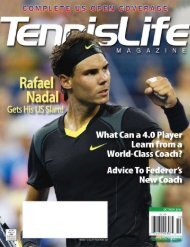A Champion's Mind - Pete Sampras
www.tennismoscow.me Insta:TENNISMOSCOW
www.tennismoscow.me Insta:TENNISMOSCOW
Create successful ePaper yourself
Turn your PDF publications into a flip-book with our unique Google optimized e-Paper software.
that you can’t wait to get out there to mix it up with your opponent, even if you’re not guaranteed the win.<br />
It’s the kind of nervous that makes some great football players throw up before a big game.<br />
I also thought about how the final hadn’t been a well-played match. Sure, the wind might have had<br />
something to do with it. My food poisoning may have been a factor. Stefan’s own fatigue, after his death<br />
march to the final, was in the mix, too. But this is what I kept thinking: If he didn’t play that well, and I<br />
didn’t play that well, why did he win? And the answer dawned on me, slowly, over a matter of weeks.<br />
For the first time, I understood and could articulate the truth: I lost because I had packed it in. And it was<br />
part of a pattern.<br />
Coming face-to-face with that reality enabled me to admit that on two critical occasions in 1992—the<br />
Wimbledon semi with Goran and the Open final with Edberg—I had more or less quit while I still had<br />
some reserves to call on. The Edberg match was the straw that broke the camel’s back. If I didn’t care,<br />
who would? I had wasted two big moments, and there was no guarantee that I would experience those<br />
moments again.<br />
My future was no longer a matter of how good I could get in order to put myself in a position to win big<br />
events. I was there; I was plenty good. I wasn’t developing anymore in any significant technical or<br />
physical way, I was developed (except in my grass-court game). The real question was, Did I want to win<br />
majors? The Edberg match forced me to confront that. I slowly came to a realization about myself that<br />
wasn’t very pretty. I didn’t tell anyone, not even Dad. It would have been easy enough to do; all I<br />
would’ve had to say was, “Listen, I have a confession to make: I packed it in on some big occasions.” But<br />
I internalized it, and got no forgiveness from the harshest judge of them all—myself.<br />
My inner dialogue went on for about two months: Why make this thing more complicated than it needs<br />
to be? If you see the other guy struggling, why follow suit? True, I’d been feeling a little overwhelmed<br />
by my swift climb to the top of the game, but I was also a little too content with what I was achieving.<br />
Why, I finally asked myself, are you being such a pussy?<br />
It took me some years to come up with the answer, and here it is in its most simple form: Everybody<br />
has a place in this world, and spends a good part of his mature life carving out his niche—the zone where<br />
he is comfortable. Some guys, they get to number one and they think, I don’t really like it up here, it’s too<br />
lonely. Too stressful. Too demanding. So they settle back a little. They find a comfort zone at number<br />
three, or five, or whatever. I could have done that; a part of me was doing that early in my career. The<br />
truth is that when you’re anywhere but at number one, you can hide. You can get to the second week of<br />
majors regularly, win one now and then, earn a lot of respect and money, and lead a great, stress-free life.<br />
I honestly can’t tell you why my conversation with commitment took this tack, but it did: I decided that I<br />
had this great talent and I wasn’t taking care of it. I had the Gift, and I was turning away from it, at least on<br />
some of the very occasions when it was maybe the only thing that could pull me through. It wasn’t going to<br />
be good enough for me to just be in the mix; it would nag and wear at me. I realized that the game was not<br />
about getting somewhere, but staying somewhere. Some of us, we get there and we don’t want to let it go.<br />
We don’t want to see some other guy take it. And that’s ultimately what makes you a warrior—a fully<br />
formed, mature competitor.<br />
You can’t really teach someone determination, although you can nurture it. It’s something that is either<br />
in you or not, and you have to figure it out as an individual. And if you decide you need to be number one,<br />
you have to realize you can’t hide. You have to get fitted for the bull’s-eye on your back and get used to<br />
living with it.<br />
I was ready. That 1992 Edberg match was my Rubicon, my version of that famous Muhammad Ali<br />
moment when he threw his Olympic gold medal into the Ohio River one night. At the end of 1992, I was<br />
determined to have a huge 1993.

















